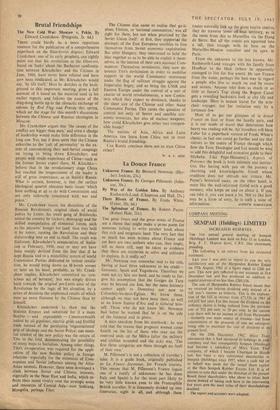Brutal Friendships
The New Cold War: Moscow v. Pekin, By
Edward Crankshaw. (Penguins, 2s. 6d.) THERE could hardly be a more opportune moment for the publication of a comprehensive paperback on the Sino-Soviet dispute; Edward Crankshaw, one of its early prophets, can rightly point out that his revelations in the Observer, based on 'leaks' about the Bucharest confronta- tion between Khrushchev and the Chinese in June, 1960, have never been refuted and have now been vindicated, as Mr. Khrushchev would say, 'by life itself.' Here he sketches in the back- ground to this important meeting, gives a full account of it based on the material used in his earlier reports, and follows the course of the ding-dong battle up to the climactic exchange of salvoes by Red Flag and Pravda this spring, which set the stage for this month's discussions between the Chinese and Russian ideologists in Moscow.
Mr. Crankshaw argues that 'the causes of the conflict are bigger than men,' and even a change of leadership would make little difference in the long run. Yes, but it does seem that the Chinese subscribe to the 'cult of personality' to the ex- tent of concentrating their anti-Soviet campaign on trying to bring down Khrushchev; and people with inside experience of China—such as the former Soviet expert there, M. Klotchko- believe that in the revolutionary stage China has reached the temperament of the leader is still of great importance, as in Stalin's Russia: What is certain, however, is that the surface ideological quarrel obscures basic issues 'which have nothing at all to do with Communism and are only indirectly concerned with war and peace.'
Mr. Crankshaw traces the distortion of the Russian Revolution's original ideals of social justice by Lenin; his small gang of Bolsheviks seized the country by trickery, demagogy and the skilled manipulation of elemental forces, such as the peasants' hunger for land; then they held it by terror, turning the Revolution and their dictatorship into an end in itself. The result was Stalinism. Khrushchev's renunciation of Stalin- ism in February, 1956, may or may not have been mainly derived from the fear that if he kept Russia tied to a monolithic system of world Communist Parties dedicated to violent revolu- tion, he would bring down an H-bomb sooner or later on his head; probably, as Mr. Crank- shaw implies, Khrushchev committed no 'con- scious act of betrayal,' but was simply driven back towards the original pre-Lenin aims of the Revolution by the logic of his situation, by a series of decisions the unplanned results of which were no more foreseen by the Chinese than by himself.
Khrushchev undertook to thaw out the Stalinist Empire and substitute for it a more flexible — and expandable — Commonwealth united by oil pipelines, electric grids and fruitful trade instead of the paralysing 'organisational' grip of ideology and the Secret Police; one essen- tial symbol of the new policy was the return of Tito to the fold, demonstrating the possibility of many ways to Socialism. Among other things, Tito's co-operation was required for the appli- cation of the new flexible policy in foreign relations—especially for the extension of Com- munism and Soviet influence among the Afro- Asian neutrals. However, there soon developed a clash between Soviet and Chinese interests, especially in the Near East and India, which re- flects their latent rivalry over the strategic areas and resources of Central Asia—over Sinkiang, Mongolia, perhaps Tibet.
The Chinese also came to realise that go-it- alone Titoism, or 'national communism,' was all right for them, but not when practised by the Soviet Union itself: at first, they supported the attempts of the East European satellites to free themselves from Soviet economic exploitation. But after Hungary, they intervened to hold the bloc together so as to be able to exploit it them- selves, in the interest of their own national Com- munism. Themselves revisionists, they now de- nounce Tito's revisionism in order to mobilise support in the world Communist movement under the flag of militant struggle against the Imperialist bogey, and so bring the USSR and Eastern Europe under the control of a sort of caucus of world revolutionaries, a new Comin- tern which they expect to dominate, thanks to the sheer size of the Chinese and other Asian Communist Parties. This raises the question of control not only of Soviet and satellite eco- nomic resources, but also of nuclear weapons; how could Khrushchev give either into irrespon- sible hands?
The nations of Asia, Africa and Latin America can learn from China not to trust Russia's brutal friendship.
Can Russia convince them not to trust China either?
W. A. C. ADZE






























 Previous page
Previous page